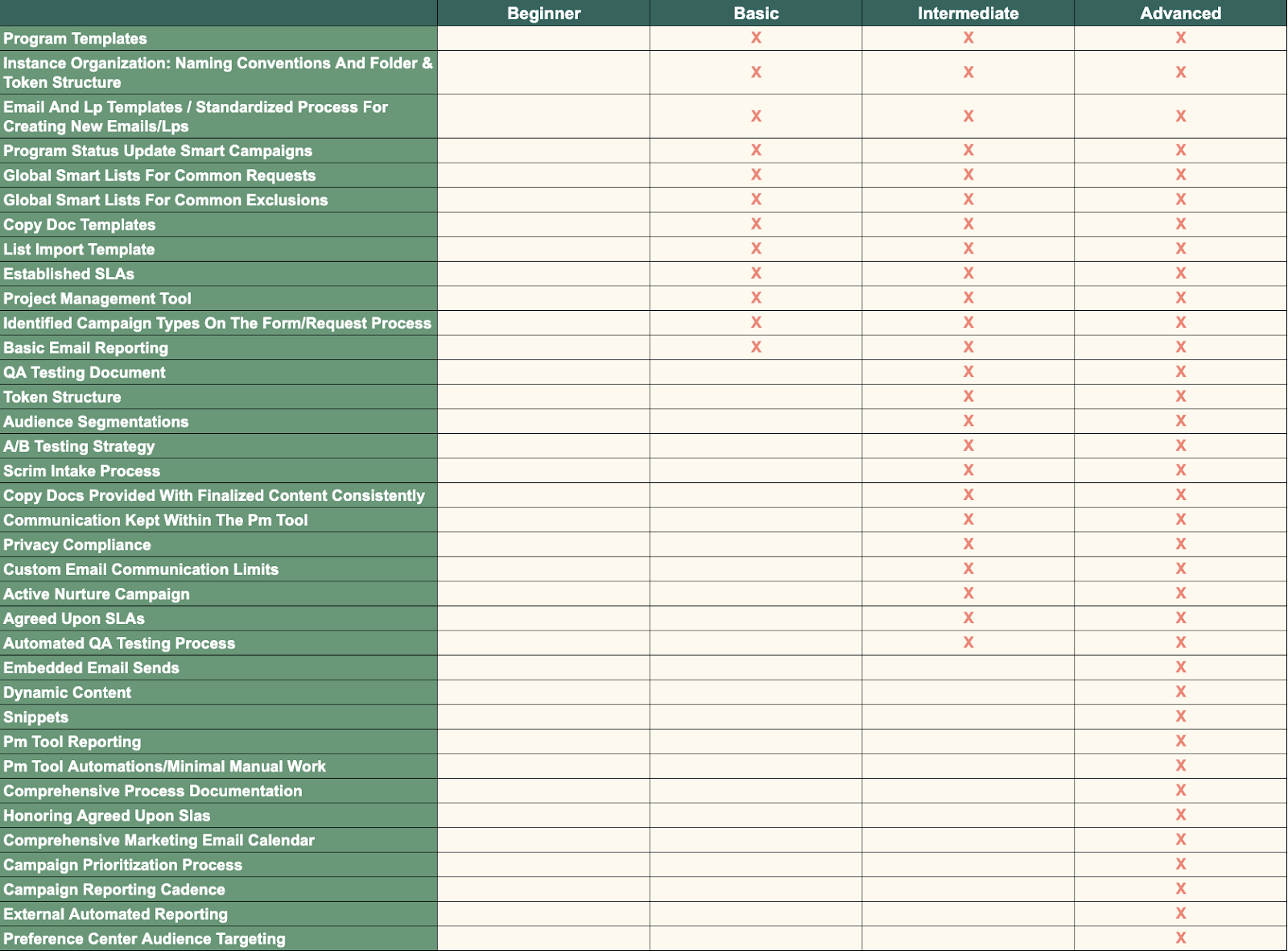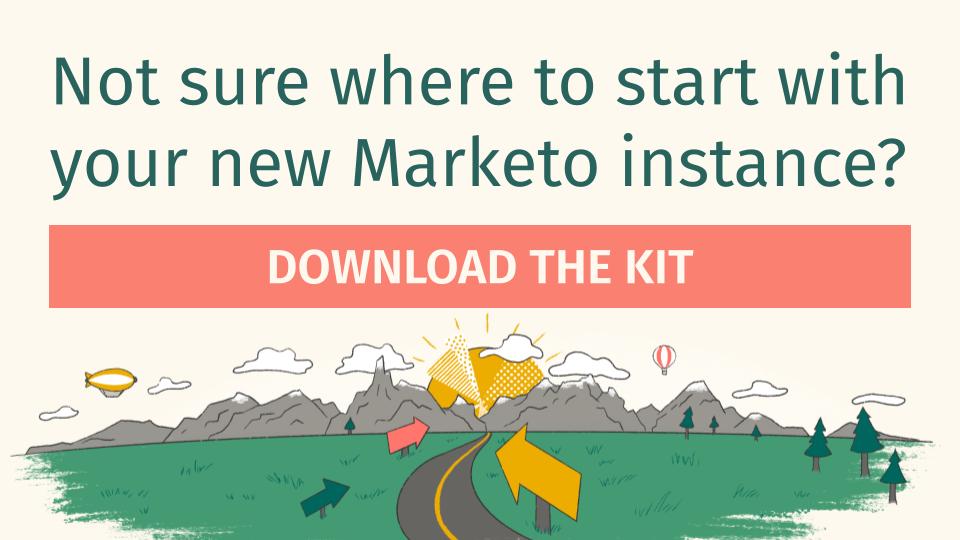Have you ever wondered how your campaign operations function stacks up on a maturity curve? Maybe not, but I bet you are now (see what I did there?).
Evaluating your campaign operations maturity lets you take an honest look at where you are at currently and in what areas you have room to grow. Let’s take a dive into Etumos’ maturity curve.
What are the Maturity Curve Stages?
Etumos has established four stages of COPs maturity: Beginner, Basic, Intermediate, and Advanced. Let’s look at each one more closely.
Beginner
The Beginner stage is just that, the very beginning. You might fall in this stage if you have a brand new marketing automation platform (MAP) instance and are just getting started. You recognize the need to scale marketing activities, improve personalized messaging strategies and measure campaign performance as it relates to funnel conversion, but you’re just getting started! Don’t worry, you’ll get there and this will hopefully give you some ideas for next steps.
Basic
At the Basic stage you have processes in place to scale multi-channel campaign execution to deliver personalized, targeted messaging and measure campaign performance based on funnel conversion. Now we’re talkin’! But what does that actually mean? Basically you’ll have processes in place that help you execute on your campaigns from intake to email reporting so you can start pushing out marketing campaigns. Here’s the list:
- Project Management Tool
- Identified Campaign Types on the Form/Request Process
- Established SLAs
- Content Submission Templates
- List Import Template
- Program Templates
- Scalable Naming Conventions and Folder structure
- Email and LP Templates / Standardized Process for Creating New Emails/LPs
- Program Status Update Smart Campaigns
- Global Smart Lists for Common Requests
- Global Smart Lists for Common Exclusions
- Basic Email Reporting
Intermediate
At the Intermediate stage you likely have all core campaign processes and basic reporting in place to support hypothesis-based marketing initiatives and execute basic nurture strategies. Experimentation and optimization are being leveraged to improve marketing effectiveness and overall funnel conversion. Essentially you’ve probably refined some processes, incorporated some A/B testing, and might have an active nurture or two. Woohoo!
Here’s the full list of what an intermediate maturity stage might look like in addition to the Basic list:
- SCRIM Intake Process
- Copy Docs Consistently Provided with Finalized Content
- Agreed upon SLAs
- Communication Kept Within the PM tool
- Token Structure
- Audience Segmentations
- A/B Testing Strategy
- QA Testing Document
- Privacy Compliance
- Custom Email Communication Limits
- Active Nurture Campaign
Advanced
At the Advanced Stage you’ll likely have an advanced campaign intake process, automated external reporting, advanced execution processes, and process documentation to facilitate internal knowledge transfer and maintenance of all current systems & processes. Look at you go!
Here’s the list of what an advanced maturity level COPs team might be doing in addition to the Basic and Intermediate list:
- PM Tool Reporting
- PM Tool Automations/Minimal Manual Work
- Honoring Agreed Upon SLAs
- Comprehensive Marketing Email Calendar
- Comprehensive Process Documentation
- Email Prioritizing Process
- Embedded Email Sends
- Utilizing Dynamic Content and Snippets
- Automated QA Testing Process
- Preference Center Audience Targeting
- Campaign Reporting Cadence
- External Automated Reporting
Here’s a look at the full list of attributes and where they fall in the matrix.

Now what?
Do you need to have ALL of these in order to be at an Advanced maturity level? Not at all. Some of these might not work for your process or MAP and that’s okay.
Ready to do a quick evaluation of your campaign operations? Go through the list below and keep a tally of what your COPs team currently has or is doing:
☑️ Program Templates
☑️ Instance Organization: Naming Conventions and Folder & Token Structure
☑️ Email and LP Templates / Standardized Process for Creating New Emails/LPs
☑️ Program Status Update Smart Campaigns
☑️ Global Smart Lists for Common Requests
☑️ Global Smart Lists for Common Exclusions
☑️ Copy Doc Templates
☑️ List Import Template
☑️ Established SLAs
☑️ Project Management Tool
☑️ Identified Campaign Types on the Form/Request Process
☑️ Basic Email Reporting
☑️ QA Testing Document
☑️ Token Structure
☑️ Audience Segmentations
☑️ A/B Testing Strategy
☑️ SCRIM Intake Process
☑️ Copy Docs Provided with Finalized Content Consistently
☑️ Communication Kept Within the PM tool
☑️ Privacy Compliance
☑️ Custom Email Communication Limits
☑️ Active Nurture Campaign
☑️ Agreed upon SLAs
☑️ Automated QA Testing Process
☑️ Embedded Email Sends
☑️ Dynamic Content
☑️ Snippets
☑️ PM Tool Reporting
☑️ PM Tool Automations/Minimal Manual Work
☑️ Comprehensive Process Documentation
☑️ Honoring Agreed Upon SLAs
☑️ Comprehensive Marketing Email Calendar
☑️ Campaign Prioritization Process
☑️ Campaign Reporting Cadence
☑️ External Automated Reporting
☑️ Preference Center Audience Targeting
Now let’s add them up.
24+ = Advanced
12-23 = Intermediate
11 or fewer = Basic
Where do you fall on the maturity curve?
You’re Doing Great
Remember, there is no wrong answer and you don’t have a “bad” COPs process or MAP if you have a lower maturity level. Your campaign operations might be at the Basic maturity level and you’re looking for new ways to grow, or you might be working on perfecting a few things before venturing onto something new. You might be at the Intermediate level and might feel content or maybe itching to grow a little more. This is just to help you gauge where your campaign operations might be in maturity and to give you some ideas for next steps if you want to increase that maturity.







